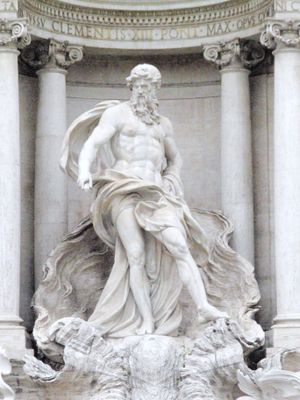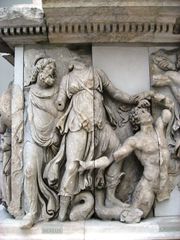أوقيانوس
| Oceanus | |
|---|---|
primordial god of the sea | |
 أوقيانوس في نافورة ترڤي، روما | |
| المسكن | Arcadia |
| معلومات شخصية | |
| الأبوان | Uranus and Gaia[1] |
| الأشقاء | Tethys, Cronus, Rhea, Theia, Hyperion, Themis, Crius, Mnemosyne, Coeus, Phoebe, Iapetus, The Cyclopes and The Hundred-Handers |
| Consort | Tethys |
| الأنجال | Thetis, Metis, Amphitrite, Dione, Pleione, Nede, Nephele, Amphiro, and the other Oceanids, Inachus, Amnisos and the other Potamoi |
| المكافئ الروماني | Oceanus |
أوقيانوس (Oceanus، وباليونانية: Ὠκεανός ؛ تـُنطق [ɔːkeanós]) كان شخصية مقدسة في القدم الكلاسيكي، وكان اليونانيون القدماء والرومان يعتقدون أنه تجسيد مقدس للبحر، الذي هو نهر هائل يحيط بالعالم.
Strictly speaking, Oceanus was the ocean-stream عند خط الإستواء in which floated the habitable hemisphere (οἰκουμένη, oikoumene).[2] Thus, the sun rises from the deep-flowing Oceanus in the east[3] and at the end of the day sinks back into the Oceanus in the west.[4] In Greek mythology, this world-ocean was personified as a Titan, a son of Uranus and Gaea. In Hellenistic and Roman mosaics, this Titan was often depicted as having the upper body of a muscular man with a long beard and horns (often represented as the claws of a crab) and the lower body of a serpent (cf. Typhon). On a fragmentary archaic vessel of circa 580 BC (British Museum 1971.11-1.1), among the gods arriving at the wedding of Peleus and the sea-nymph Thetis, is a fish-tailed Oceanus, with a fish in one hand and a serpent in the other, gifts of bounty and prophecy. In Roman mosaics, such as that from Bardo he might carry a steering-oar and cradle a ship.
Some scholars believe that Oceanus originally represented all bodies of salt water, including the Mediterranean Sea and the Atlantic Ocean, the two largest bodies known to the ancient Greeks. However, as geography became more accurate, Oceanus came to represent the stranger, more unknown waters of the Atlantic Ocean (also called the "Ocean Sea"), while the newcomer of a later generation, Poseidon, ruled over the Mediterranean.
| سلسلة الآلهة اليونانية | |
|---|---|
| الآلهة الأزلية | |
| الأولمپيون | |
| آلهة مائية | |
| الآلهة التحتانية | |
| مفاهيم مشخصنة | |
| آلهة أخرى | |
| الجبابرة | |
| الجبابرة الإثنا عشر: | |
| Oceanus و تثيس, | |
| هايپريون وثيا, | |
| كوئيوس وفيبه, | |
| كرونوس وريا, | |
| Mnemosyne, ثميس, | |
| كريوس, اياپتوس | |
| أنجال هايپريون: | |
| إيوس، هليوس، سلنه | |
| بنات كوئيوس: | |
| لتو وأستريا | |
| أبناء اياپتوس: | |
| أطلس، پرومثيوس، | |
| Epimetheus, Menoetius | |
| أبناء كريوس: | |
| Astraeus, پالاس | |
| پرسيس | |
Oceanus' consort is his sister Tethys, and from their union came the ocean nymphs, also known as the three-thousand Oceanids, and all the rivers of the world, fountains, and lakes.[5] From Cronus, of the race of Titans, the Olympian gods have their birth, and Hera mentions twice in Iliad book XIV her intended journey "to the ends of the generous earth on a visit to Oceanus, whence the gods have risen, and Tethys our mother who brought me up kindly in their own house."[6]
In most variations of the war between the Titans and the Olympians, or Titanomachy, Oceanus, along with Prometheus and Themis, did not take the side of his fellow Titans against the Olympians, but instead withdrew from the conflict. In most variations of this myth, Oceanus also refused to side with Cronus in the latter's revolt against their father, Uranus.
. . . . . . . . . . . . . . . . . . . . . . . . . . . . . . . . . . . . . . . . . . . . . . . . . . . . . . . . . . . . . . . . . . . . . . . . . . . . . . . . . . . . . . . . . . . . . . . . . . . . . . . . . . . . . . . . . . . . . . . . . . . . . . . . . . . . . . . . . . . . . . . . . . . . . . . . . . . . . . . . . . . . . . . .
علم الكون
Oceanus appears in Hellenic cosmography as well as myth. Cartographers continued to represent the encircling equatorial stream much as it had appeared on Achilles' shield.[7]
Though Herodotus was skeptical about the physical existence of Oceanus, he rejected snowmelt كسبب للفيضان السنوي لنهر النيل؛ according to his translator and interpreter, Livio Catullo Stecchini, he left unsettled the question of an equatorial Nile, since the geography of Sub-Saharan Africa was unknown to him.
شجرة نسب الأولمپيين في الأساطير اليونانية
. . . . . . . . . . . . . . . . . . . . . . . . . . . . . . . . . . . . . . . . . . . . . . . . . . . . . . . . . . . . . . . . . . . . . . . . . . . . . . . . . . . . . . . . . . . . . . . . . . . . . . . . . . . . . . . . . . . . . . . . . . . . . . . . . . . . . . . . . . . . . . . . . . . . . . . . . . . . . . . . . . . . . . . .
انظر أيضاً
الهامش
- ^ http://www.theoi.com/Titan/TitanOkeanos.html
- ^ See Stecchini, "Ancient Cosmology".
- ^ Homer, Odyssey xix 433–434
- ^ Homer, Iliad, VIII 485
- ^ The late classical poet Nonnus mentioned "the Limnai [Lakes], liquid daughters of Oceanus." (Nonnus, Dionysiaca 6.352)
- ^ Iliad xiv. 200 and 244.
- ^ http://www.metrum.org/mapping/cosmol.htm
مصادر
- Karl Kerenyi. The Gods of the Greeks. Thames and Hudson, 1951.
وصلات خارجية
- Livio Catullo Stecchini, "Ancient Cosmology"
- Theoi Project - Okeanos
 Chisholm, Hugh, ed. (1911). . دائرة المعارف البريطانية (eleventh ed.). Cambridge University Press.
Chisholm, Hugh, ed. (1911). . دائرة المعارف البريطانية (eleventh ed.). Cambridge University Press. {{cite encyclopedia}}: Cite has empty unknown parameter:|coauthors=(help)

